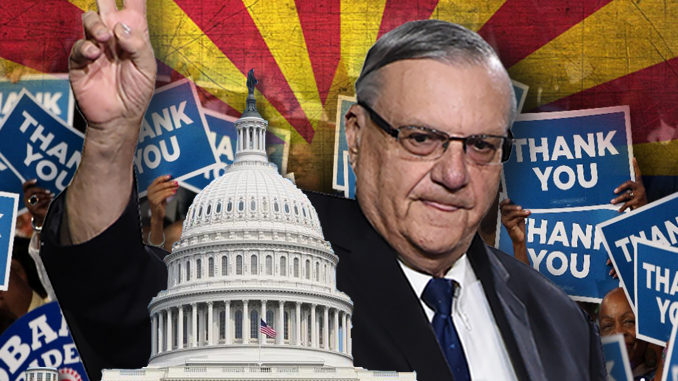
Famed Arizona lawman “Sheriff Joe” Arpaio spoke with AFP about his upcoming campaign plans to run for the Arizona U.S. Senate seat being vacated by Republican Jeff Flake. He talks about his sole reason for running, his previous election experiences, the recently concluded criminal misdemeanor contempt case brought against him by the feds and its one “loose end,” and more.
By Mark Anderson
Former longtime Arizona Sheriff Joe Arpaio spoke to AFP Jan. 21 in an exclusive interview about his recently announced bid to fill the seat of departing U.S. Sen. Jeff Flake (R-Ariz.). While reflecting on his 58 years in federal and state law enforcement and discussing his political views, the embattled but resilient lawman said he intends to serve for one term and feels he has a respectable chance to prevail.
“What’s good about my race is that I’m not going to make a career out of it,” he told AFP. “My sole intention is to serve the people of Arizona.”
Comparing his Senate bid with his past Maricopa County election efforts that earned him the sheriff’s post for 24 years, Arpaio is challenging mainstream-media naysayers. He points out that, since Maricopa County is larger in population and/or land area than 18 states, this statewide Senate race is not too much of a stretch, especially given his notoriety.
“I’ve never lost a Republican primary,” he said. “I won seven of them,” including even the 2016 sheriff’s office primary by a comfortable margin despite media efforts to scuttle his primary bid. He lost the general election to a former Phoenix police officer, amid sustained negative publicity about the government taking him to trial.
A three-way primary is already shaping up. Besides Arpaio, Republican Kelli Ward, a former state senator, is running, as is one-term GOP Congresswoman Martha McSally, a retired Air Force officer. Democratic Rep. Kyrsten Sinema is running, too, and she’ll likely have a primary challenge.
Since Sen. Flake is vacating his seat, partly over blowback from excessively ridiculing Trump’s policies, Arpaio has the advantage of not having to unseat an incumbent. He also has good statewide and national name-recognition in a border state whose two sitting senators both stump for amnesty for illegal immigrants.
“Arizonans largely continue to see illegal immigration as a major problem but believe undocumented immigrants should be treated humanely,” according to a March 2015 poll by Arizona State University’s Morrison Institute for Public Policy.
Arpaio said that his critics who see him as a rogue character “forgot all the drug and alcohol rehabilitation programs I had in the jail,” referring to humane policies he applied toward assisting prisoners, including illegal aliens.
Arpaio said that a major motivation for his Senate run is that Flake, along with the other Arizona senator, John McCain, are part of a small establishment-Republican vanguard who’ve unduly and unfairly obstructed the president’s agenda, including Trump’s pledge to stop runaway immigration, an issue on which Arpaio and Trump clearly agree.
Yet most media, Arpaio said, report as if this vanguard represents virtually the entire Senate.
“You can count the vocal ones on one hand,” Arpaio remarked. “But I don’t like what’s going on with the two senators from Arizona zeroing in on the president.”
Notably, Sens. Flake, Lindsey Graham (R-S.C.), and Cory Gardner (R-Colo.) are in a faction called the “gang of six,” joining forces with Democratic Sens. Dick Durbin (Ill.), scandal-ridden Robert Menendez (N.J.) and Michael Bennet (Colo.). Their goal, according to a recent op-ed in The Hill, a Beltway newspaper, is to “give amnesty to millions of so-called Dreamers [those who entered the U.S. illegally as children] and their illegal-alien parents.”
Arpaio has a rather colorful background. After a U.S. Army stint from 1950-53, he became a Washington, D.C. Metropolitan Police officer in 1957. He also briefly served as a Las Vegas patrolman. Pursuing higher aspirations, he was sworn in as a federal Drug Enforcement Administration officer in Chicago that year in November, while getting married the following month. He calls 1957 his banner year. He and his wife, Ava, recently celebrated 60 years of marriage.
Politically, Arpaio came out early in support of Trump in 2015. Previously, he was honorary state chairman for George W. Bush’s first campaign and supported the presidential runs of Rick Perry in 2012 and Mitt Romney in 2008. He feels he’s a loyal Republican but not a GOP “rubber stamp.”
“I do agree with the president’s policies on international trade—anything that will help the economy of our country. We should be using money spent overseas on our country, on our highways and byways,” he told AFP.

Thus, Arpaio supports Trump on the NAFTA renegotiation, because it could rev up the U.S. economy as well as Mexico’s—a rebalancing that Arpaio believes would reduce the incentive for illegal border crossings into the U.S.
Arpaio has faced his share of media brickbats since at least 2006, when he became nationally known as a so-called “hardliner” for wanting to get a handle on the huge influx of illegal immigrants flowing into his jurisdiction. He was clobbered again when the Department of Justice sued him for his “willful” decision to disregard a 2011 federal injunction issued to bar him from continuing to arrest and detain illegal aliens during his time as sheriff.
On July 31, 2017 Arpaio was found guilty of misdemeanor criminal contempt by Judge Susan Bolton—who, according to one of Arpaio’s attorneys, Mark Goldman, improperly issued her verdict from the bench after a brief non-jury trial that ran four days and concluded July 6. Arpaio did not get the jury trial he had sought.
A loose end in those proceedings remains, in that Judge Bolton has refused to strike the misdemeanor from his record—something Arpaio is appealing. “She won’t erase my conviction,” he explained. “I was never brought before [her] and sentenced.”
When Trump pardoned Arpaio last Aug. 25, the prospect of him running for Senate was mentioned, though it wasn’t discussed at-length in major media. According to Arpaio, there’s no connection between the pardon and his Senate run.
“President Trump hasn’t called me, nor have I called him, before or since my Senate announcement,” he said, adding that the last time he spoke with Trump was by phone in November 2016 after Trump had won the presidency.
Mark Anderson is a longtime newsman now working as the roving editor for AFP. Email him at [email protected].




